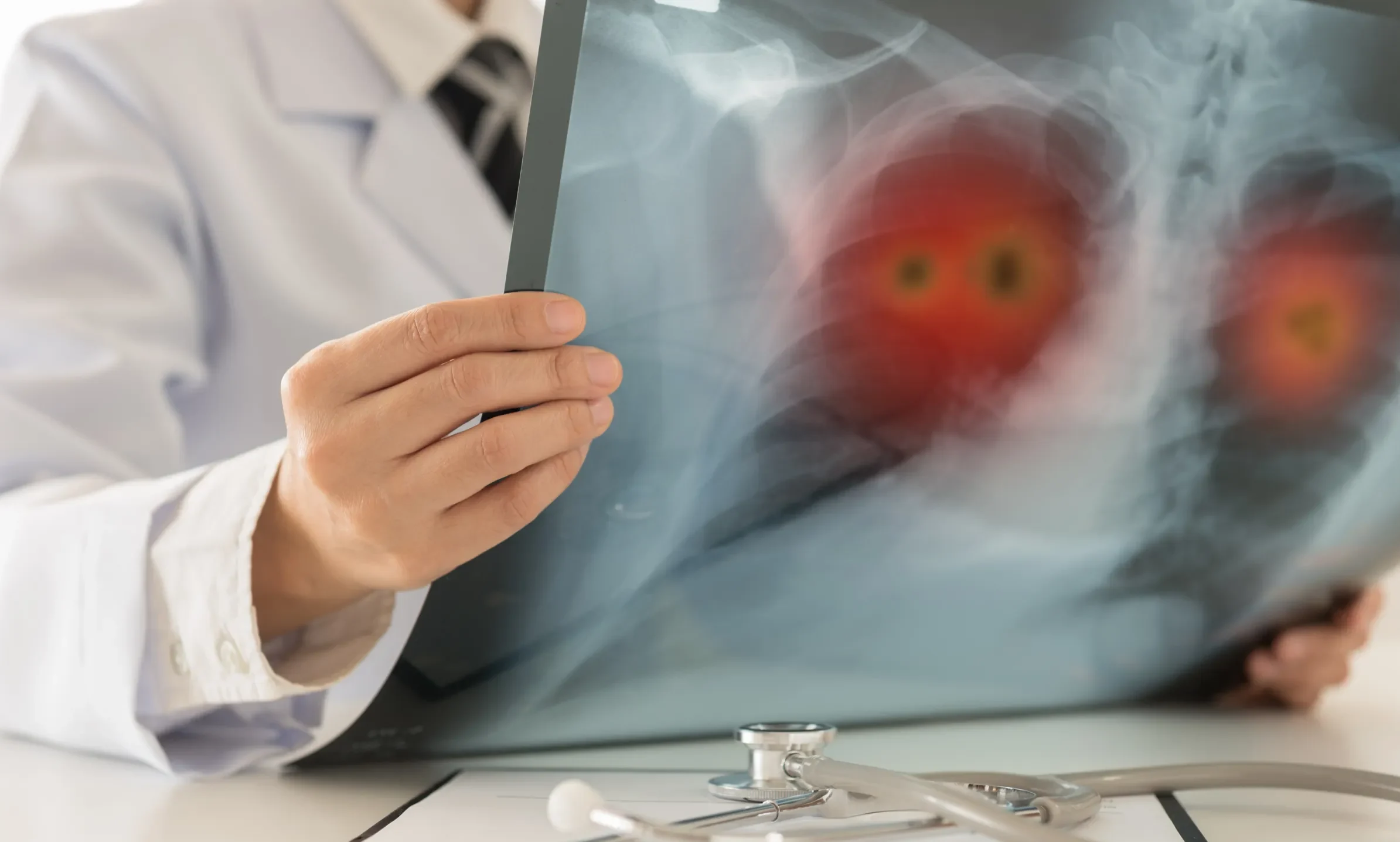-
 News
According to a WHO report, one in six people worldwide suffers from loneliness
News
According to a WHO report, one in six people worldwide suffers from loneliness
-
 News
Australia launches national lung cancer screening program: a new approach to cancer prevention among high-risk patients
News
Australia launches national lung cancer screening program: a new approach to cancer prevention among high-risk patients
-
 News
In stressful situations, people make riskier decisions
News
In stressful situations, people make riskier decisions
-
 News
Stem cell transplantation can completely cure people with severe diabetes
News
Stem cell transplantation can completely cure people with severe diabetes
-
 News
Updated COVID-19 vaccines have been shown to be effective against severe forms of the disease
News
Updated COVID-19 vaccines have been shown to be effective against severe forms of the disease
All news
Chronic lymphocytic leukemia treatment
Compared to other blood cancers, chronic lymph leukemia is less aggressive. Even after cancer cells are detected, a patient can go symptom-free and without treatment for several years.
Supportive therapy plays an important role because patients with chronic lymph leukemia are prone to bleeding, anemia, and infections as well as cancer. Contact us to learn more about chronic lymph leukemia treatment.
MedTour’s website features the best clinics for chronic lymph leukemia treatment abroad. Patients receive therapy in Israel, Turkey, Germany, Spain, and South Korea.
MedTour patients recommend clinics for the treatment of chronic lymphocytic leukemia:
Doctors for the treatment of chronic lymphocytic leukemia
Frequently Asked Questions
It is a cancerous disease in which tumor cells proliferate from the blood-forming cells of the bone marrow. CLL begins in the progenitor cells of lymphocytes.
In the chronic variant of lymphoblastic leukemia, the cells are very similar to healthy cells but have a number of differences:
- Don’t perform their protective function as well as healthy leukocytes,
- Have a longer life cycle,
- Grow and multiply faster than normal cells.
Chronic lympholeukemia can go unreported for a long time because of the slow accumulation of tumor cells. However, over time, the abnormal cells displace healthy cells, fill the bone marrow, and enter the blood, liver, and spleen.
CLL is a disease of the elderly. The average age of a patient who is first diagnosed is 70 years old. Men have the disease more often than women. The disease is very rarely diagnosed in patients over 40 years of age, and even more rarely in children.
- The disease more often develops in men,
- 9 out of 10 patients are 50 years old at the time of diagnosis,
- The next of kin of patients diagnosed with CLL have twice the risk of getting the disease,
- The disease is associated with exposure to some pesticides and the herbicide “Agent Orange”.
In Europe, doctors use the Binet system to establish the stage of the disease. The classification is based on determining the number of affected lymphatic areas — spleen, liver and lymph nodes. Also, a decrease in erythrocytes and platelets in the blood is taken into account.
In the first (A) stage, less than three lymphatic zones are affected, without anemia or thrombocytopenia.
In the second (B) stage, more than three sites with lymphoid tissue are involved in the pathological process, no decrease in the number of platelets and erythrocytes is observed.
Doctors talk about stage 3 (C) if the patient develops anemia and/or thrombocytopenia. The number of affected lymphatic zones is not taken into account.
Usually, the disease is discovered accidentally when the doctor orders laboratory blood tests to detect other health problems. Chronic lymphoblastic leukemia is asymptomatic for a long time without bothering the patient.
Symptoms in CLL are usually not specific and may be seen with other diseases:
- Sensation of weakness and increasing fatigue after minor exertion,
- Loss of weight,
- Schills,
- High body temperature,
Increased sweating at night,
- Heat at night,
- Elevated lymph nodes,
- Early feeling of fullness due to compression of the stomach by the spleen or liver.
The vast majority of symptoms are due to the replacement of normal blood cells with leukemia. As a consequence, patients may experience nosebleeds, frequent bacterial infections, and rapid fatigue.
Leukemia blood cells may give an inadequate immune response to the body’s own tissues. This leads to the development of autoimmune diseases. For example, abnormal antibodies can attack red blood cells, leading to the development of autoimmune hemolytic anemia.
When choosing a clinic, it is important to pay attention to such details:
Experienced team of specialists
A team of doctors consisting of a hematologist, medical oncologist, radiotherapist, and surgeon are involved in treating patients. Throughout treatment, other subspecialists may need to be consulted and monitored.
This means that a patient with CLL must be treated at a multidisciplinary medical center, in a specially equipped oncohematology department.
Specialized department
Abroad, treatment of lymphoblastic leukemia is performed in an oncohematology department. Such wards should be equipped with a special air filtration system, since patients are more prone to develop infectious diseases after stem cell transplantation and high-dose chemotherapy.
Modern therapies
Every year, more and more new options for effective treatment open up for patients with cancer. Patients can now be treated with targeted therapies and monoclonal antibodies or participate in research programs for new treatment methods.
Most patients choose clinics in Germany, Turkey, Israel, Spain and South Korea.
We can help you with a choice of clinics. For this you need to leave an application on the MedTour platform.
The final cost of diagnosis depends on a number of factors. The price is affected by:
- Country in which the medical center is located,
- The level of the clinic and international accreditation,
- Doctor qualifications,
- General condition of the patient,
- Patient’s general condition,
- Companion diseases,
- The stage of CLL,
- How diagnosed in the community before the visit to the clinic,
- Patient’s condition.
On average, the cost of diagnosis ranges from $2,500 to $8,000.
We can get you a personalized diagnostic program. Leave an application on our website and attach the results of your diagnostics. A medical coordinator will contact you and answer your questions.
MedTour medical platform helps patients from all over the world to arrange diagnostics and treatment in foreign medical centers. Leave your appeal on our website, and we will definitely contact you.
MedTour staff provides assistance in getting a preliminary answer from the clinic, booking an appointment with the doctor, organizing air flight, transfer, accommodation and escort for the whole period of treatment.
You do not pay anything for our services. You pay for your treatment directly at the clinic.
Current methods of diagnosis and treatment of chronic lymphoblastic leukemia abroad (2021)
How is chronic lymph leukemia diagnosed in foreign hospitals?
Doctor’s Consultation
An oncohematologist will gather a detailed medical history, clarify complaints, and find out if anyone in the family has had malignant blood diseases. Also, the specialist will examine the lymph nodes and abdominal area. This is necessary to record an increase in the liver, spleen, or lymph nodes.
Laboratory blood tests
For a general blood test, a small amount of blood is taken from the patient’s vein. Typically, CLL patients have high levels of lymphocytes and possible decreases in platelet and erythrocyte counts, up to and including anemia.
Using flow cytometry, specialists look for specific substances that indicate the presence of CLL cells in the blood, bone marrow aspirate, and any other fluids.
Before prescribing chemotherapy or other medications, the doctor may order a biochemical blood test to evaluate liver and kidney function and to measure the mineral composition of the blood.
Bone marrow biopsy
Even if blood tests show that the patient has chronic lympholeukemia, a bone marrow aspiration and biopsy is necessary to definitively confirm the diagnosis.
This procedure is usually done under local anesthesia. The contents of the bone marrow are taken with a thin needle from the femur.
In bone marrow samples, attention is paid to the absolute number of cells. Usually, it is elevated in CLL. In such a case, doctors speak of a hypercellular variant of the bone marrow.
In addition, pathologists look at the shape and size of lymphocytes, the presence of pathological inclusions in the cells. This totality of signs and tells about the presence or absence of chronic lympholeukemia in the patient.
Genetic tests
To predict the course of the disease and prescribe the appropriate treatment, the oncohematologist prescribes one or more genetic tests:
- Cytogenetics,
- Fluorescence in situ hybridization (FISH),
- Molecular tests.
Genetic tests detect mutations in genes and chromosomes, as well as changes in immunoglobulin heavy chains. These data help doctors assess the aggressiveness of chronic lympholeukemia and make appropriate prescriptions for maintenance and basic treatment.
Imaging techniques
In some situations, to assess the size of the spleen and liver, and when changes in the brain and spinal cord are suspected, the doctor may prescribe one of the following methods:
- MRI,
- Computed tomography,
- Ultrasound,
- Lumbar puncture.
How are chronic lympholeukemia treated abroad?
Chemotherapy
Chemotherapy drugs are prescribed to patients to kill tumor cells or control their growth. For CLL, patients receive medication in the form of tablets or intravenous and intramuscular injections. One course of chemotherapy, on average, takes 3 to 4 weeks.
Your doctor may prescribe one of the following medications:
- Fludarbine (Fludara®),
- Pentostatin (Nipent®),
- Cyclophosphamide (Cytoxan®), etc.
In addition to cytostatic (anti-cancer) therapy, corticosteroids such as prednisolone and dexamethasone are also prescribed.
Monoclonal antibodies
This new method of treatment consists of growing special antibodies in the laboratory. After being injected into the body, the antibodies attach themselves to the cancer cells. The immune system recognizes the leukemia cells and destroys them.
The treatment for CHL uses antibodies that attach to the CD20 and CD52 proteins. You may be prescribed these drugs:
- Ofatumumab (Arzerra),
- Obinutuzumab (Gazyva),
- Rituximab (Rituxan).
Treatment with monoclinal antibodies can take place as monotherapy or in combination with other modalities, such as chemotherapy.
Target therapy
Standard chemotherapy drugs destroy cells with rapid growth and division, including cancerous cells. This causes unwanted adverse reactions. Targeted therapy, also called targeting, works by targeting certain proteins of cancer cells that are responsible for their growth and development. This makes it possible to tailor the therapy protocol more effectively to each patient.
Kinase inhibitors are used in the treatment of chronic lympholeukemia. Kinases are a group of proteins that are responsible for transmitting signals in the cell. Your doctor may prescribe one of the following drugs:
- Ibrutinib (Imbruvica),
- Acalabrutinib (Calquence),
- Idelalisib (Zydelig),
- Venetoclax (Venclexta).
Target drugs are prescribed in combination with chemotherapy or monoclonal antibodies, or as a single treatment option.
Bone marrow transplantation (BMT)
Chemotherapy, targeted drugs, and monoclonal antibodies can keep a patient with chronic lympholeukemia well for a long time. However, relapse of the disease occurs quite often.
Currently, TCM is in the clinical trial phase and its efficacy in CLL is being evaluated.
Published:
Updated:









